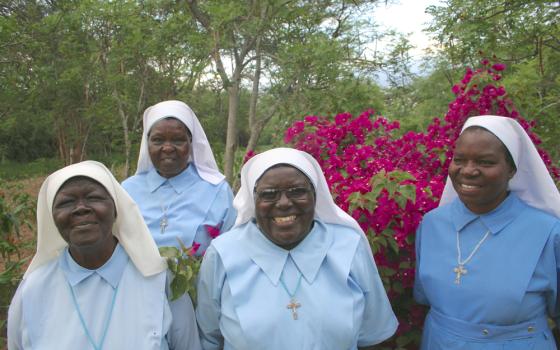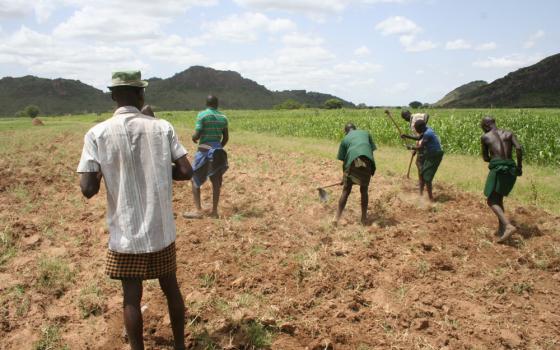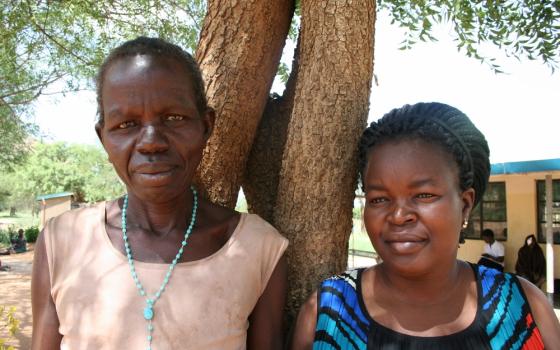An afternoon spent listening to Sr. Bibiana Anena and other members of the Little Sisters of Mary Immaculate of Gulu is bound to circle around the word “isolated” and the attendant idea of service to others.
“In a remote area like this, you can really help the doctors – because there aren’t enough of them to run all the cases,” said Anena, 64, a veteran nurse who lives with her fellow sisters in a residence within an earshot of the Kotido diocese’s office. Kotido is the commercial hub of Kotido district, part of the wider Karamoja region.
As I spoke to Anena and others recently, a late afternoon rain brought relief at the end of a hot day, not to mention needed water for a nearby garden. The short rainfall – welcomed but woefully sparse – is a reminder of the area’s persistent drought, one of several problems facing an area of Uganda that Ugandans themselves see as remote, isolated and prone to a host of problems.
“When it’s dry, it’s quite dry,” said Sr. Caroline Pifwa, 62, a social worker and now financial administrator for the diocese. “It’s difficult here.”
“I would say there was never a time when Karamoja didn’t have problems,” said Anglican Bishop James Nasak of the Anglican church’s North Karamoja diocese.
“Backwards” is how one resident of the Ugandan capital of Kampala described this area. After I returned to Kampala, another person asked me, “Did you find food there?” – a reference to the region’s long history of hunger and even famine. (The region faced a serious famine in the early 1980s.)
“There’re a lot of gaps here, even today,” said Dr. Lochap Paul, who heads the Caritas operations in the Catholic diocese of Kotido. “There is a complex layer of many issues.”
To get to Karamoja, in northeast Uganda about 350 miles from Kampala, requires two days of car travel. There is a slow, at first imperceptible, change from a verdant green landscape – almost forest-like – to the denuded and dry brown (though flecked with green) savannah that seems to share more in common with neighboring South Sudan than Uganda’s lush center.
Karamoja is tough, rugged country – an American is bound to make comparisons with it and the southwestern United States – and has faced numerous challenges in the last few decades, aside from drought and poverty.
One is insecurity. Anena recalls an incident during Holy Week in 2007 when she and others got caught in an ambush with four armed men. Anena prayed the rosary, and left the scene unscathed, but the incident was typical of a region once awash in guns. That has changed in recent years with the decline of battles over cattle rustling.
For Anena and others who experienced violence first-hand, that is no small matter.
“There is peace now and you can move freely,” Anena said. “There are no more ambushes like there used to be.” She pointed at me. “If you had been here years ago, you’d be driving with escorts.”
Still, it’s a region where a legacy of neglect and a present still defined by poverty and uncertainty might yet tip the balance toward civil or political unrest like South Sudan, its neighbor to the north. Many in Karamoja are still vulnerable – dependent on outside food assistance from the World Food Programme, which earlier this year reported that two-thirds of the population was eating what is barely the adequate minimum of food.
Over the course of several days, when I asked villagers in a number of locales how many were hungry, all raised hands.
“Ninety percent of the population here live on less than a dollar a day,” Anena said.
Karamoja is also a place where debates over how best to improve the lives of its residents can be intense, and where cultural disagreements among Ugandans themselves are not uncommon. Many of those working in Karamoja, in what can be broadly called humanitarian work – education, nursing, training of various kinds – are from other parts of the country, including other parts of northern Uganda that were once the center of the Lords’ Resistance Army, led by Joseph Kony.
Many don’t like what they see as deep-rooted cultural practices that they believe can be harmful and keep the region impoverished. And some feel “a closed culture,” not welcoming to outsiders, is common here.
One particular problem that Anena and Pifwa believe hold the region back is the extreme imbalance in gender relations – as in men dictating how to spend family income, while women are expected to do – and indeed, do – “too much” of a household’s labors.
“The mother goes to the field to get food,” corn and sorghum mainly, Anena said. “That’s the work of women and girls.” So is building a family’s home.
“Men sit under the tree and discuss the matters of the house,” Anena added, not hiding her sarcasm. Pifwa, meanwhile, noted the lack of job opportunities for women, a fact bound up with a traditional view that girls should not be educated.
The Catholic church and the Anglican church are the major religious actors in the region, and both have created needed networks of schools, as well as health centers, that the sisters say are laying a foundation for a better future for girls and women.
This is hardly a surprise. “When you go to pray on Sunday, it’s the women,” Pifwa said. A common refrain among women attending church is, “‘I go to church because I know God is there,’” Pifwa said. And as for those keeping the week-to-week activities of the church going? “It’s the women doing everything,” she added.
In a culture where women are often vulnerable – domestic violence is way too common, many say – and where women often don’t have a voice, it is not surprising that many women find a home in church, a place where “God keeps you strong,” Pifwa said.
There is another reason, too. “Very few men attend church and very few take religion seriously,” Pifwa said. Why not? It may because of the common cultural practice of polygamy.
“Co-wives,” she added, waving her hand dismissingly and shaking her head.
It is a practice that, of course, favors men but puts women at a distinct disadvantage. “When a man gets a new wife, the old wife is abandoned,” Anena said.
Yet the church cannot merely be safe space – the networks of schools, clinics and food assistance programs have to provide concretely in a region where needs remain acute. “In this region, if you don’t provide for the physical needs of the people, then they will not listen to you,” said Anglican Bishop Nasak.
For the foreseeable future, “the most vulnerable” – women and children – line up in clinics, as do some men. Anena and other health workers do their best to salve wounds and treat illnesses.
While there is more of a government presence and support than there used to be around issues of health, clinics are still underfunded and overcrowded.
One health worker I spoke to in late June, Akello Nikolina, had not been paid in weeks but continued her work nonetheless. To say there are challenges is an understatement: the clinic takes in about 90 patients a day and is in dire need of more space and equipment, particularly for post-natal and children’s care.
One of the patients of Nikolina’s clinic, Lodur Angelina, 56, a widow with eight children, said she has required treatment at the clinic twice this year and is grateful that the clinic is close to her home. But she called her situation and of other community members as “really terrible; people have nothing to eat. People are hungry here.” Greens and some water are a typical day’s diet.
That needs outstrip resources is all too common. “It’s difficult,” Pifwa said. “You want to give, but you want to give what you don’t have. So we give in the name of God, but it is difficult.”
Anena agreed. Speaking of the clinic where she works, she said, “We are able to keep the unit running day and night, but only because we trust in the help of God. Despite the lack of funds, things are still running, through the help of God.”
Sr. Esther Auma, 65, a retired teacher and another member of the order, shrugged her shoulders.
“It’s a struggle,” she said, “but we fight the good fight.”
[Chris Herlinger is a contributing writer to NCR on humanitarian and international issues, an author and senior writer for the humanitarian agency, Church World Service.]






